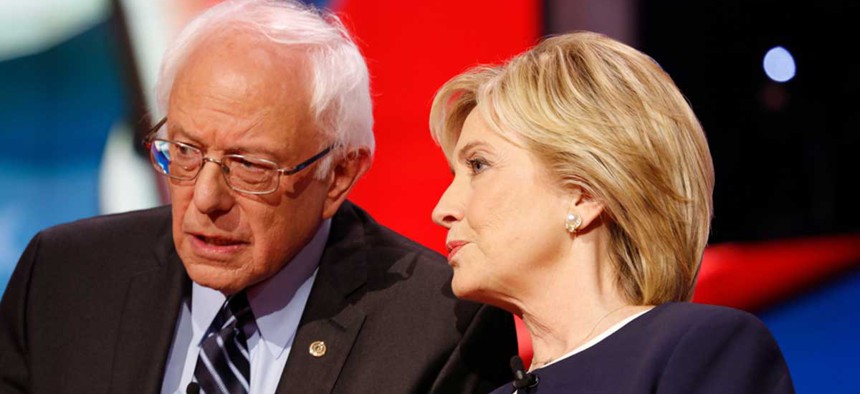
Joseph Sohm / Shutterstock.com
Clinton Can Use Her VP Choice to Bridge Divide With Sanders
Fellow Democrats think she should use the No. 2 slot to reach out to the party’s liberal wing.
Presidential nominees pick running mates for all kinds of reasons. Hillary Clinton, some of her fellow Democrats say, should focus on one goal in particular: building a bridge.
Interviews with a number of liberal Democrats on Capitol Hill reveal a view that Clinton, if she becomes the nominee, can use the choice of a No. 2 to appeal to supporters of progressive firebrand Bernie Sanders.
Asked about the VP pick, Senate Democratic Whip Richard Durbin, who backs Clinton, emphasized the Sanders factor.
“She is going to have to be mindful that Bernie Sanders has a large following, and if he is not the nominee and she is, that she makes it clear that the message he was carrying that resonated so well across America, particularly among Democrats, is going to be respected in her presidency,” Durbin told reporters in the Capitol on Wednesday.
“How she would do that I can’t say—whether it is Cabinet appointments or legislation or whatever,” he said. Or through her choice of running mate? “Who knows? That has to be part of the calculation if she is the nominee.”
There are certainly bridges that need building. In a recent McClatchy-Marist poll, a quarter of Sanders’s supporters said they would not back Clinton in the general election if she’s the nominee.
And the primary race has turned more bitter after its genteel early stages, with clashes over each others’ qualifications, climate change, and other issues.
Even beyond the recent sniping, Sanders’s unexpectedly popular campaign has brought a surge of enthusiasm among progressives that lawmakers say could be tapped with the right choice by Clinton—perhaps progressive Sen. Elizabeth Warren, one Democrat suggested.
“I think Elizabeth Warren would be great,” said Rep. Adam Smith, a Washington state Democrat who has endorsed Clinton.
“The biggest advice I have is try and get someone who will keep the enthusiasm that comes from the Bernie Sanders camp,” he said.
Other names thrown around include Housing and Urban Development Secretary Julián Castro, Sen. Sherrod Brown, Sen. Tim Kaine (who would be a nod toward the center), and Labor Secretary Thomas Perez.
“There are plenty of good names out there, including some of my colleagues in the Senate, who would be excellent vice presidential choices,” Durbin said without mentioning names.
For some lawmakers who back Clinton, the whole discussion is premature. “I think it’s important we just focus on this nomination effort,” said Rep. Sander Levin.
“Wasted elevator ride,” Sen. Dianne Feinstein told National Journal in an elevator in the Capitol, after noting that she had not given the issue any thought yet. And here’s Senate Democratic leader-in-waiting Chuck Schumer when asked whether he had thoughts on the matter: “No.”
“I don’t think people should get ahead of themselves,” said Rep. Earl Blumenauer. “She has as broad a Rolodex as anybody in the Western Hemisphere and she knows lots of people, and we are still learning in this political process.”
But another Clinton supporter, Rep. Elijah Cummings, said it’s important to find someone who can appeal to the excited supporters who have packed Sanders rallies in crowds of 15,000 to 25,000, and are attracted to his message about the influence of money in the political system.
“You have got to have folk who I think the Bernie Sanders crowd feel comfortable with,” Cummings said, though he more broadly emphasized the need for Clinton to send a message to diverse constituencies.
Rep. Raul Grijalva, one of just nine Capitol Hill lawmakers to endorseSanders thus far, agrees that Clinton’s choice will matter on the Left if Sanders falls short.
“I think that it has to be someone that comes with … the message that Bernie is taking through this whole race on economics, on restructuring, on wage disparity, and how we tax in this country,” Grijalva said. “A candidate who can articulate that, and take that on the road, would be very useful.”







